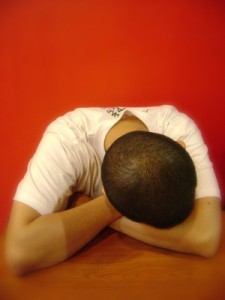 Regular exercise is the key to staying happy and healthy, and it reduces the overall burden of personal healthcare. When it comes to exercising, most people are familiar with the image of a slovenly couch potato courting heart disease and hypertension through lack of physical activity and poor eating choices; however, this might not be so obvious when the pendulum swings to the other side of the spectrum. Professional athletes have their coaches to pull them back if they over-train, but the same cannot be said for “civilian†fitness buffs who train on their own, particularly if they’re aiming to meet a particular fitness target.
Regular exercise is the key to staying happy and healthy, and it reduces the overall burden of personal healthcare. When it comes to exercising, most people are familiar with the image of a slovenly couch potato courting heart disease and hypertension through lack of physical activity and poor eating choices; however, this might not be so obvious when the pendulum swings to the other side of the spectrum. Professional athletes have their coaches to pull them back if they over-train, but the same cannot be said for “civilian†fitness buffs who train on their own, particularly if they’re aiming to meet a particular fitness target.
Performance that is consistently poorer is an early sign that you need more time to recover and ease up on the workout load. This is so that you have time to regain your earlier level of performance. A decline in performance is more obvious when it comes to activities involving endurance. These include running, cycling, or swimming.
Along with poorer performance, a person who is over-exercised tends to be prone to poor moods such as irrational anger, depression, irritability, and anxiety. These moods are a reflection of the stress-related hormonal changes that a physically overstressed body undergoes.
A consequence of feeling overworked physically and subsequently mentally, is perpetual fatigue. This also affects a person physically and then mentally. Rather than reducing the amount of exercise done, it can trigger a futile cycle of exercising more to regain the energy levels enjoyed previously, but result in a person feeling even worse.
This can lead to a person becoming disinterested in exercise. If a person is unaware that the problem is over-exercising, he or she is likely to feel guilty about being “lazy” and exercise more, causing even greater frustration.
Exercising too much means that you don’t allow yourself enough time to recover from workouts. In addition to prolonged fatigue, this is translated into slower recovery times, e.g., soreness that lasts longer than usual, and a greater frequency of injury occurrence or pain.
The body needs time to rest from the micro-injuries it suffers in the course of a workout. This ensures that it becomes stronger and is less likely to become injured. Just like the commitment to fitness, you must make it a point to get sufficient rest and nutrition.





